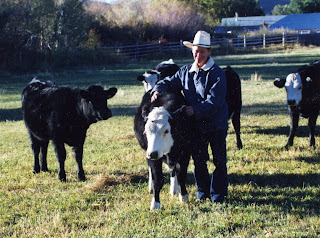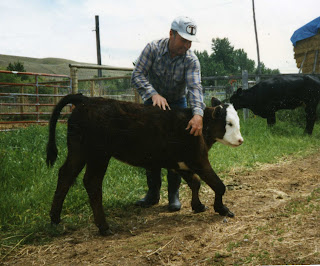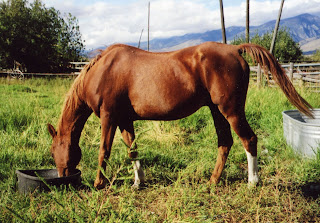Most of us try to farm or ranch wherever we happen to be.
Here's my husband Lynn, checking some of our cows on
the steep hill pasture behind our house. We are utilizing
steep mountainsides that won't grow crops, but they
provide grazing for our cattle part of the year.
Here's my husband Lynn, checking some of our cows on
the steep hill pasture behind our house. We are utilizing
steep mountainsides that won't grow crops, but they
provide grazing for our cattle part of the year.
Several times in the past I’ve read articles or heard speeches by agricultural experts giving advice on how to make a profit or how to run a better business. Many consultants and agricultural experts try to impress upon ranchers and farmers that our work should be a business and not a way of life, that in order to survive we must have better plans and become more businesslike. Just the other day I heard someone say that agriculture must cease to be a lifestyle and begin to be a business.
Granted, to survive financially we have to be as business oriented as possible, seeing where our money "leaks" are, trying to get more production at less input cost. But farming and ranching can never be just a business for the family unit, as it is for big corporations. It's different for the large companies, who have looked at all the angles, crunched the numbers, and located themselves in places with optimum conditions and opportunity or market for their particular crop. Most of us "little guys" are trying to farm or ranch wherever we happen to be, and we are attempting to deal with a wide variety of conditions that may not be as highly productive. Our "business" may be handicapped from the start. Yet if we were to rely only on the "big guys" for our food, this country would starve. We need our family farms.
And these smaller family operations will not all survive as businesses — not in our country today, with its cheap-food policy and relatively low prices for the crops and animals we produce. These smaller operations will only continue to survive because the people involved are hooked on agriculture as a way of life and will find ways to continue in spite of low prices for their product and high costs of their inputs.
My "supplemental" job for the past 45 years — to create
extra income so we could survive on the ranch —
was writing stories and articles.
extra income so we could survive on the ranch —
was writing stories and articles.
We cannot feed our population with what the big corporations produce. A vast amount of food is grown by many family farms and ranches, by folks with a small acreage, a few cows or sheep, a small dairy. All our efforts together add up to a large amount of food, and if we all quit tomorrow, it would be devastating at the supermarket and the local food coop. For instance, more than half the beef produced in America is grown by stockmen who own 50 cows or fewer, so the small farmers do make a big difference in our food supply.
Yet the family farm has trouble making a profit. Usually, someone in the family has to work off the farm to make ends meet. It's not that we are poor businesspeople; we are caught in a cycle of low food prices and high input costs. Some of those high input costs are due to our individual situations; we may be a long way from markets and have to transport supplies in and spend a lot of diesel hauling our cattle out, for instance. There are always ways we can tighten up an operation, cut costs, and possibly increase production, but they are not always enough to make a truly self-supporting business, because of the built-in discrepancies between the price for our product and the high cost of our expenses. In most ag situations inflation has escalated our expenses faster than the price increases for our product, so our margin of profit shrinks or disappears.
Yet the family farm has trouble making a profit. Usually, someone in the family has to work off the farm to make ends meet. It's not that we are poor businesspeople; we are caught in a cycle of low food prices and high input costs. Some of those high input costs are due to our individual situations; we may be a long way from markets and have to transport supplies in and spend a lot of diesel hauling our cattle out, for instance. There are always ways we can tighten up an operation, cut costs, and possibly increase production, but they are not always enough to make a truly self-supporting business, because of the built-in discrepancies between the price for our product and the high cost of our expenses. In most ag situations inflation has escalated our expenses faster than the price increases for our product, so our margin of profit shrinks or disappears.
We are in agriculture not for business reasons but
because we love the land and the animals we raise.
because we love the land and the animals we raise.
Yet most of us will continue to farm and continue our "unbusinesslike" practices. The advisors who try to help us cannot understand that we are in agriculture not so much for business reasons but because we love the land and the livestock and will continue to farm or ranch even if we have marginal places or live in an area that is not optimum (because of poor soil, climate, and so on) for highest yields on our crops or best gain on our cattle. In some climates it’s hard to raise cattle without needing expensive winter feed.
If we were to depend only on the farmers who conduct their operations strictly as a business and who chose to farm or ranch where conditions are best for maximum production (yield per acre or pounds of beef raised per cow) at lowest input cost, there would be many tons of food not produced. We cannot all farm where soil and moisture is best for crops or hay or for grazing yearlings for lowest cost of gain or getting the cow herd through winter without the use of harvested feed or expensive supplements. We make do with the situation where we are. If we eliminated the "marginal" outfits that are struggling to produce food in less than optimum conditions, we would eliminate a great deal of this country's production.
If we were to depend only on the farmers who conduct their operations strictly as a business and who chose to farm or ranch where conditions are best for maximum production (yield per acre or pounds of beef raised per cow) at lowest input cost, there would be many tons of food not produced. We cannot all farm where soil and moisture is best for crops or hay or for grazing yearlings for lowest cost of gain or getting the cow herd through winter without the use of harvested feed or expensive supplements. We make do with the situation where we are. If we eliminated the "marginal" outfits that are struggling to produce food in less than optimum conditions, we would eliminate a great deal of this country's production.
The fact that many of us survive in agriculture under rather adverse conditions says a lot for our ingenuity, hardiness, and determination; our innovations and creativity in using the plant and animal genetics available to us; and the advantages of our free enterprise system — we find ways to do things we want to do, even if we don't have the best situation in which to try to do it. And as long as we have any semblance of a free system, we will continue to make it work.
Our life work raising cattle is a matter of ethics and stewardship,
not just dollars, and we take good care of them all — such as
this orphan calf that became a pet for our youngest grandchildren.
Little Danielle (holding the calf's bottle) named him Shiney.
not just dollars, and we take good care of them all — such as
this orphan calf that became a pet for our youngest grandchildren.
Little Danielle (holding the calf's bottle) named him Shiney.
Agriculture is not just a question of dollars made (careful balance of inputs and all of our management decisions weighted by how they will affect profit or loss). It's also a question of ethics and stewardship. If our daily work and decisions must be based solely upon "business," most of us would choose another line of work.
Many of us have less than ideal soil or growing conditions. Yet because of our creative gumption, we survive by adapting to fit our environment and circumstances and by adopting a flexibility in our philosophy of life that enables us to not be bothered by the long hours for little pay. We enjoy what we are doing.
It was not economically feasible, for instance, to keep the crooked-legged calf alive (born with a severe birth defect because her mother ate lupine in early pregnancy), yet we did. The crippled calf could not travel to graze or keep up with Mama, so she and the cow had to stay home from summer pasture and be fed hay, which we are always short on. Sure, we butchered that calf when she got bigger, but if we were operating our place strictly as a business, we would have knocked her in the head at birth and saved ourselves the twice-daily unpaid task of feeding and watering her. We've donated our time and used up some expensive feed. But the satisfaction of seeing this calf enjoy life, albeit a short one, was worth it to folks like us who don't count all our efforts in dollars.
It was not economically feasible, for instance, to keep the crooked-legged calf alive (born with a severe birth defect because her mother ate lupine in early pregnancy), yet we did. The crippled calf could not travel to graze or keep up with Mama, so she and the cow had to stay home from summer pasture and be fed hay, which we are always short on. Sure, we butchered that calf when she got bigger, but if we were operating our place strictly as a business, we would have knocked her in the head at birth and saved ourselves the twice-daily unpaid task of feeding and watering her. We've donated our time and used up some expensive feed. But the satisfaction of seeing this calf enjoy life, albeit a short one, was worth it to folks like us who don't count all our efforts in dollars.
This lupine calf, named Queenie (shown here at two months of age and
at ten months of age, just before we butchered her), is one we raised
in spite of her crippled legs. She had a good life during her time on our ranch.
at ten months of age, just before we butchered her), is one we raised
in spite of her crippled legs. She had a good life during her time on our ranch.
Likewise, the kids' or grandkids’ old horse that is too unsound now to be ridden is put out to pasture for a long retirement (and is fed hay every winter), eating feed that would otherwise go to a productive animal. And when the time comes, he'll be buried on the place instead of sold. Another "loss." Yet how do you put a value on his years of service and what he meant to the family and to the children who loved him?
Over the years on our ranch, we've kept a number of "questionable" animals that certainly did not pay their way in terms of money. But they added to our own quality of life and feeling of worth. As raisers of livestock we are responsible for their existence; they would not be on this earth but for us. Therefore we are responsible for their health and care. It is an entrustment we take seriously; we try to make their stay on our place as comfortable and pleasant as possible, and they reward us with their trust, their enjoyment of life, and their fascinating individuality. All of this is an intangible part of being a caretaker of animals and cannot be measured in terms of a "business."
Many times we do things that are not necessarily profitable, but we do them because we feel compelled — out of duty or conscience or what is best for the animals or the land. Our extra effort and time spent is not for the goal that it is "good for business" but rather for our own sense of commitment.
Our granddaughter's thirty-year-old horse, Chance, eating grain in his retirement.
Whatever our crop, be it cattle or corn, soybeans or range grass, organic vegetables or lambs, if we love what we are doing, we are blessed. If we can feel at one with the land and reap a certain satisfaction in doing our best — a job well done (in spite of whether or not we always get a good price or a profit) — we are lucky people. We have found our niche on this planet, found a way to counteract the restless uncertainty of our modern technical society and our environmentally paranoid generation. We have found a way to be at peace with ourselves and with nature.
We've also found a good place to raise our children (and grandchildren), where they can learn the realities of life and the responsibilities that make dependable, mature adults. And we'll fight to keep our way of life. We are not in this as a business; we are here for the long haul.
There are varying degrees of this type of commitment. Some ranchers and farmers will sell out when conditions become adverse financially and their "business" is not profitable enough. Some will retire when they begin to grow weary. And many of these early quitters who choose to leave the "business" will have regrets because they miss the "unbusinesslike" aspects of this lifestyle.
We've also found a good place to raise our children (and grandchildren), where they can learn the realities of life and the responsibilities that make dependable, mature adults. And we'll fight to keep our way of life. We are not in this as a business; we are here for the long haul.
There are varying degrees of this type of commitment. Some ranchers and farmers will sell out when conditions become adverse financially and their "business" is not profitable enough. Some will retire when they begin to grow weary. And many of these early quitters who choose to leave the "business" will have regrets because they miss the "unbusinesslike" aspects of this lifestyle.
This has been a good place to raise our children and grandchildren,
where they can learn responsibilities: Here's seven-year-old
granddaughter Heather Carrie riding with her mom, Carolyn,
on old Molly to check range cattle. A few years later she is riding
old Chance, helping sort cattle in the corral, with her loyal dog at her side.
where they can learn responsibilities: Here's seven-year-old
granddaughter Heather Carrie riding with her mom, Carolyn,
on old Molly to check range cattle. A few years later she is riding
old Chance, helping sort cattle in the corral, with her loyal dog at her side.
And some of us will stay on the land as long as is humanly possible. We will find ways to augment our income if necessary, in order to continue even when our "business" is losing money. We are committed to agriculture in a way that no businessperson is committed to in his or her company, job, or profession. This is more like a marriage than a business, and we stick to it through thick and thin, for richer, for poorer.
Yes, we may be able to find ways to make our operation more businesslike in order to survive financially, but please, don't anyone try to tell me that agriculture should be a business instead of a way of life. The bottom line is that we're here because it is our life, and that is why we will continue to survive, against all odds.
Heather Smith Thomas raises horses and cattle on her family ranch in Salmon, Idaho. She writes for numerous horse magazines and is the author of several books on horses and cattle farming, including Storey’s Guide to Raising Horses, Storey's Guide to Training Horses, Stable Smarts, The Horse Conformation Handbook, Your Calf, Getting Started with Beef and Dairy Cattle, Storey's Guide to Raising Beef Cattle, Essential Guide to Calving, and The Cattle Health Handbook. You can read all her Notes from Sky Range Ranch posts here.










No comments:
Post a Comment